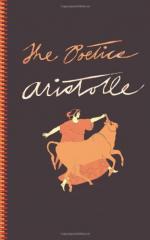
|
| Name: _________________________ | Period: ___________________ |
This quiz consists of 5 multiple choice and 5 short answer questions through Section III.
Multiple Choice Questions
1. When constructing the plot, the poet ought to do what first, according to Aristotle?
(a) Outline the plot in totality.
(b) Develop the ending of the story.
(c) Fill out the individual episodes and scenes.
(d) Develop the beginning of the story.
2. Which of the following is an example that Aristotle provides of a readers' confusion being not the fault of the poet, but more so of the reader's?
(a) The reader is not educated.
(b) The reader is assuming one specific meaning of a word that has multiple meanings.
(c) The reader has a very small vocabulary.
(d) The poet uses current language.
3. When Homer says that Odysseus accomplished a certain number of deeds, what does Aristotle say the reader should do?
(a) Interpret this literally.
(b) Infer that Odysseus simply accomplished a large number of deeds.
(c) Understand that Odysseus is a busy man.
(d) Question Homer's ability to write believable stories.
4. In poetry, Aristotle says that in the "Odyssey" recognition comes about how??
(a) The suitors recognize him by his face.
(b) Penelope recognizes his walk.
(c) Odyssues's nurse recognizes him from his scar.
(d) None of the answers is correct..
5. What example does Aristotle provide of recognition occurring through the will of the poet?
(a) One character may reveal himself to another for no reason.
(b) There is no such thing as recognition through the will of the poet.
(c) A character is revealed when the poet announces it.
(d) The main character reveals himself to the antagonist when the reader least expects.
Short Answer Questions
1. What would Aristotle say about the following action: a man is about to kill his brother, thinking him to be his enemy, but discovers his identity and therefore spares his life?
2. Like any art, poetry is defined by Aristotle as what?
3. How does Aristotle define "poetic charm"?
4. How does Aristotle differentiate epic poetry from tragic poetry?
5. Why does Aristotle believe that a failed action by a person who is aware of the circumstances is considered to be of a certain quality?
|
This section contains 436 words (approx. 2 pages at 300 words per page) |

|




